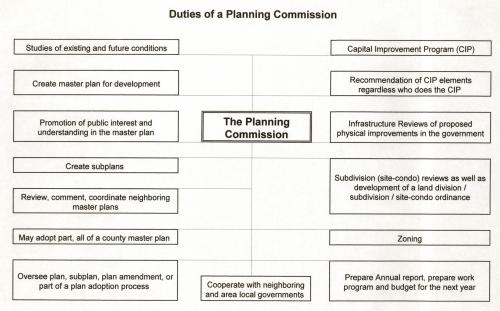A metropolitan county planning commission can, and should, apply to both urban and rural counties
Metropolitan county planning commissions are about more cooperation and intergovernmental coordination in planning. It is not something for just urban or metro-like counties.
Every so often, Michigan State University Extension educators receive a question about the differences between a county planning commission and a “Metropolitan county planning commission.” There is not a big difference, and differences are more historic in nature.
Today, the term “metropolitan county planning commission” is actually a poor label for what it actually means. It has much less to do with being a “metropolitan” county or not. In fact, some rural counties are organized as metropolitan county planning commissions.
The term is used in the Michigan Planning Enabling Act (at MCL 125.3837). It is there to provide two options for the creation of a county planning commission. First, option is the creation of a county planning commission – that would have all or some of the same duties as any city, village or township planning commission except as it applies to a county. The second option is to create a “metropolitan county planning commission.”
Any planning commission, including a county planning commission has a list of duties and functions as illustrated in the chart with this article and spelled out in more detail in this MSU Extension News article: Planning commission is much more than zoning. In addition to the above duties, the “metropolitan county planning commission” also includes coordination of all related plans of local governments (county, city, village, township) within the region [county], and intergovernmental coordination of all related planning activities among the state and local governmental agencies within the region [county].

(Historically, there was a movement at the end of World War II to distinguish metro counties from rural counties and to provide metro counties more regional planning-like functions. An incentive was the possibility of grants from the federal government for metropolitan counties.)
Hopefully, in this day-and-age, all planning commissions want and do coordinate and especially county planning commissions do so.
Today the distinction is very subtle, and actually may represent very little difference from a county planning commission – since a county planning commission already reviews all municipal plans (within and adjacent to the county), and township zoning ordinances and zoning amendments from within the county. This cross-review of all proposed plans and sharing of completed plans was added to the responsibilities of all planning commissions by 2002 amendments to former planning acts (now found at MCL 125.3839 to 125.3845). This MSU Extension News article has more detail about coordinated plan reviews: Government planning coordination begins with review of master plans and zoning ordinances.
Because it is not a big distinction, and best planning practice would be to pro-actively have intergovernmental coordination and coordination of plans, the sample text of an ordinance to create a planning commission prepared by MSU Extension includes creation of a county planning commission as a metropolitan county planning commission (page 17 (section 111.B.) in Land Use Series: “Sample #1B; Ordinance to create a planning commission” (found at web page http://lu.msue.msu.edu/pamphlets.htm#BSample)).



 Print
Print Email
Email




